高中英语必修三知识点总结
高一英语全部必修三知识点

高一英语全部必修三知识点
必修三的知识点主要涵盖了语法、阅读理解、写作等多个方面。
以下是本篇文章的内容分节:
第一节:名词和代词
名词是英语中最基本的词类之一,它用来表示人、事物、地点等。
名词有可数和不可数两种形式,可以用来作主语、宾语等。
代词则用来代替名词,避免重复使用,分为人称代词、物主代词、指示代词等。
第二节:动词和时态
动词是表示行为、状态或存在的词,根据不同的时态可以表示
过去、现在或将来的动作。
除了基本形式的动词,还有进行时、
完成时等形式。
第三节:形容词和副词
形容词用来修饰名词,描述人或事物的特征。
副词则修饰动词、形容词或其他副词,用来表示时间、地点、方式等。
第四节:介词和连词
介词用于引导名词或代词与其他词之间的关系,表达位置、时间、方式等。
连词则用来连接句子或句子的部分,起到衔接的作用。
第五节:从句和复合句
从句是一个句子中的一部分,由连词引导,可以在句子中作主语、宾语或其他成分。
复合句由一个主句和一个或多个从句组成,句子结构更加复杂。
第六节:阅读理解和写作
阅读理解是对文章进行理解和分析,包括理解主旨、推理、推
断等。
写作则是用英语进行表达的能力,需要掌握句子结构、词
汇运用、语法规则等。
总结:
必修三的知识点涵盖了英语的基础语法、阅读理解和写作技巧。
掌握这些知识点对于学习英语、提高英语水平至关重要。
通过系
统地学习和实践,我们可以逐渐提升自己的英语能力,并在日常
生活和学习中灵活运用。
英语必修3知识点总结
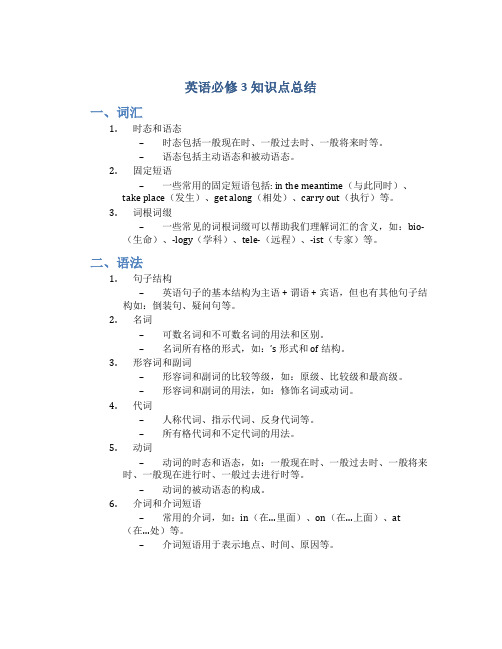
英语必修3知识点总结一、词汇1.时态和语态–时态包括一般现在时、一般过去时、一般将来时等。
–语态包括主动语态和被动语态。
2.固定短语–一些常用的固定短语包括: in the meantime(与此同时)、take place(发生)、get along(相处)、carry out(执行)等。
3.词根词缀–一些常见的词根词缀可以帮助我们理解词汇的含义,如:bio-(生命)、-logy(学科)、tele-(远程)、-ist(专家)等。
二、语法1.句子结构–英语句子的基本结构为主语 + 谓语 + 宾语,但也有其他句子结构如:倒装句、疑问句等。
2.名词–可数名词和不可数名词的用法和区别。
–名词所有格的形式,如:’s 形式和 of 结构。
3.形容词和副词–形容词和副词的比较等级,如:原级、比较级和最高级。
–形容词和副词的用法,如:修饰名词或动词。
4.代词–人称代词、指示代词、反身代词等。
–所有格代词和不定代词的用法。
5.动词–动词的时态和语态,如:一般现在时、一般过去时、一般将来时、一般现在进行时、一般过去进行时等。
–动词的被动语态的构成。
6.介词和介词短语–常用的介词,如:in(在…里面)、on(在…上面)、at (在…处)等。
–介词短语用于表示地点、时间、原因等。
三、阅读理解1.阅读技巧–了解不同类型的阅读题目,如:细节理解题、推理判断题等。
–通过阅读标题、段落开头和结尾等来帮助理解文章。
2.主题和要点–通过阅读理解文章找出文章的主题和主旨。
–了解如何从文章中找出重要的信息和细节。
3.推理判断–根据文章内容进行推理判断,如:推测作者的观点、推断故事的发展等。
4.词汇理解–根据上下文推测词汇的含义。
四、写作技巧1.写作的基本要求–语法正确、逻辑清晰、表达准确等。
2.写作的步骤–阅读题目,明确写作目的和要求。
–做好写作的提纲,列出要点和观点。
–进行语言组织,将提纲中的要点和观点转化为完整的句子和段落。
–最后进行修改和润色,确保写作的质量。
高中英语必修三知识点
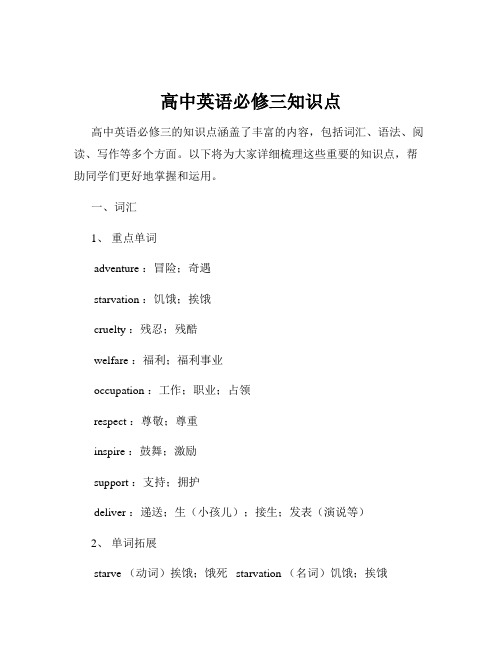
高中英语必修三知识点高中英语必修三的知识点涵盖了丰富的内容,包括词汇、语法、阅读、写作等多个方面。
以下将为大家详细梳理这些重要的知识点,帮助同学们更好地掌握和运用。
一、词汇1、重点单词adventure :冒险;奇遇starvation :饥饿;挨饿cruelty :残忍;残酷welfare :福利;福利事业occupation :工作;职业;占领respect :尊敬;尊重inspire :鼓舞;激励support :支持;拥护deliver :递送;生(小孩儿);接生;发表(演说等)2、单词拓展starve (动词)挨饿;饿死 starvation (名词)饥饿;挨饿cruel (形容词)残忍的;残酷的 cruelty (名词)残忍;残酷occupy (动词)占领;占据 occupation (名词)工作;职业;占领respect (动词/名词)尊敬;尊重 respectful (形容词)恭敬的;有礼貌的 respectable (形容词)值得尊敬的;体面的3、短语搭配in search of 寻找be concerned about 关心;挂念put up 举起;张贴;搭建stand for 代表;象征set up 建立;设立belong to 属于in memory of 纪念come into being 形成;产生二、语法1、宾语从句宾语从句在句中作宾语,一般位于及物动词或介词之后。
宾语从句要用陈述句语序。
例如:I wonder if he will come (if 引导宾语从句)We are interested in what he said (what 引导宾语从句)2、表语从句表语从句在句中作表语,位于系动词之后。
常见的系动词有:be, look, seem, sound, feel 等。
例如:The problem is that we don't have enough money (that 引导表语从句)3、主语从句主语从句在句中作主语,通常位于句首。
高中英语必修三知识点总结(详细版)

必修三各单元知识点总结第一单元1)starvevi.“饿死,挨饿”。
starve for …,表示“渴望获得,迫切得到”。
starve to death 饿死2)plenty3)satisfy作及物动词,表示“满意,使满足”,直接跟宾语。
be satisfied with对……满足be satisfied to do sth满足于做某事4)harm作名词,意为“损害”,常与do,come,mean等动词搭配。
do more harm than good弊大于利There’s no harm in doing sth= It does no harm for sb to do sth做某事无害处5)lead作及物动词,表示“领导,引导”。
表示“影响,致使”时,后接介词to,也可以接不定式。
lead sb into使某人陷入某种不良的状态。
lead sb by the nose牵着某人的鼻子,完全操纵某人lead a dog’s life过困难的生活lead the way带路,带头lead to 导致,致使6)origin是名词,表示“起源,起因,出身”。
be of origin起源于,出身于7)event是名词,表示“事变,事件”,既可以指历史上的,国际上的,国内的大事件,也可以指日常事件,复数形式还可以指事态的发展和结局。
也可以指体育比赛中的“项目”。
常见词组:at all events/in every event总之,无论如何,不管怎样in the event结果,终于in the event of万一,如果,倘若in that event若果那样的话8)dress作及物动词,表示“给……穿衣”,后接人作宾语,也可以做不及物动词,表示“穿上衣服,穿着衣服”。
dress up穿上盛装,打扮dress作不可数名词,表示“衣服”;作可数名词,表示“妇女及儿童的衣服”。
dress sth up修饰,掩饰9)trickplay a trick on sb=play sb a trick开某人的玩笑,诈骗某人do/turn the trick达到(预期的)目的,获得成功。
英语必修三知识点总结

英语必修三知识点总结Unit 1: Teenage lifeIn this unit, we learn about the life of teenagers and the challenges they face. We discuss the importance of communication and understanding between teenagers and adults. We also learn about the development of teenagers and how they navigate their way through these crucial years. Additionally, we focus on the issues of peer pressure and how to deal with it.Unit 2: Growing upIn this unit, we explore the physical, emotional and psychological changes that occur during adolescence. We discuss the impact of family, friends, and society on the development of teenagers. We also learn about the importance of self-identity and self-esteem during this stage of life.Unit 3: EducationIn this unit, we delve into the education system and the various forms of education available. We discuss the pros and cons of different types of education, such as public schools, private schools, and homeschooling. We also learn about the challenges and opportunities that come with education.Unit 4: HealthIn this unit, we focus on the importance of maintaining good health. We discuss various health issues that affect teenagers, such as eating disorders, substance abuse, and mental health. We also learn about the importance of a healthy lifestyle, including diet, exercise, and mental well-being.Unit 5: WorkIn this unit, we explore the world of work and the opportunities available to teenagers. We discuss the importance of gaining work experience and the skills needed to succeed in the workplace. We also learn about the challenges of balancing work with school and other responsibilities.Unit 6: TechnologyIn this unit, we examine the impact of technology on teenagers. We discuss the benefits and drawbacks of technology, such as social media, smartphones, and the internet. We also learn about the importance of using technology responsibly and the dangers of cyberbullying and online predators.Unit 7: Art and creativityIn this unit, we delve into the world of art and creativity. We discuss the various forms of art, such as music, painting, and literature. We also learn about the importance of self-expression and the benefits of engaging in creative activities.Unit 8: Global challengesIn this unit, we explore the challenges facing the world today, such as environmental issues, poverty, and conflict. We discuss the importance of global cooperation and the role teenagers can play in addressing these challenges. We also learn about the impact of our actions on the world and the importance of being responsible global citizens.Overall, the knowledge gained from the study of these units is crucial for teenagers as they navigate their way through this stage of life. It provides them with the necessary tools and understanding to face the challenges and opportunities that come their way.。
高中英语必修3知识点总结

高中英语必修3知识点总结高中英语必修三涵盖了诸多语言知识和文化背景。
下面是对高中英语必修三相关知识点的总结:一、词汇与语法:1. 动词时态和语态:包括一般现在时、一般过去时、一般将来时、现在进行时、过去进行时等时态的用法,以及被动语态的构成和用法。
2. 名词:包括可数名词和不可数名词的区别,以及名词的复数形式和所有格的构成。
3. 代词:包括人称代词、物主代词、反身代词、指示代词和不定代词的用法与形式。
4. 形容词和副词:包括形容词和副词的比较级和最高级、形容词的位置等。
5. 连词:包括关系词的用法、并列连词的用法等。
二、阅读理解:1. 主旨理解:能够通过阅读短文理解文章的主旨和中心思想。
2. 推理判断:能够根据文章内容推断出作者的意图和观点。
3. 句子理解:能够理解并翻译句子中的关键词和句子结构。
4. 阅读技巧:能够利用上下文推断词义、根据关键词找出答案、略读和精读等阅读技巧。
三、写作技巧:1. 基本句型:能够使用简单句、并列句、复合句等不同的句式来表达自己的意思。
2. 文章结构:能够根据写作要求组织文章的结构,包括引言、正文和结论。
3. 语言表达:能够使用适当的词汇和句子结构来表达自己的观点和想法。
4. 文章连贯:能够使用适当的过渡词和句子连接词来使文章更加连贯。
四、听力技巧:1. 听力材料:能够听懂各种语速和不同口音的英文材料,包括对话、短文等。
2. 听力策略:能够运用听力策略,如留意关键词、注意听力材料的结构、预测答案等,提高听力效果。
3. 听力题型:能够听懂并回答听力材料中的多种题型,如选择题、填空题、判断题等。
五、口语表达:1. 日常口语:能够运用相关的口语表达来进行日常对话,包括问候、介绍、购物、旅行等。
2. 主题演讲:能够准备并进行与特定主题相关的演讲,包括自我介绍、学校经历、环境保护等。
六、文化背景:1. 文学和艺术:了解英语国家的文学和艺术,如莎士比亚、达·芬奇等。
2. 地理和历史:了解英语国家的地理和历史,如伦敦、美国独立战争等。
高中必修三英语的知识点
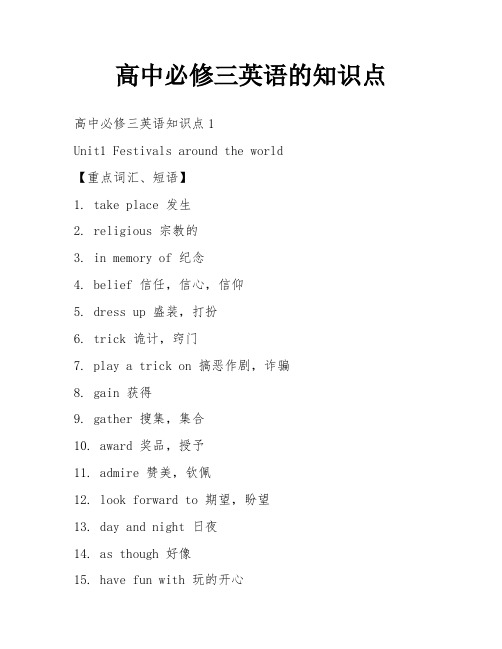
高中必修三英语的知识点高中必修三英语知识点1Unit1 Festivals around the world【重点词汇、短语】1. take place 发生2. religious 宗教的3. in memory of 纪念4. belief 信任,信心,信仰5. dress up 盛装,打扮6. trick 诡计,窍门7. play a trick on 搞恶作剧,诈骗8. gain 获得9. gather 搜集,集合10. award 奖品,授予11. admire 赞美,钦佩12. look forward to 期望,盼望13. day and night 日夜14. as though 好像15. have fun with 玩的开心16. permission 许可,允许17. turn up 出现,到场18. keep one’s word 守信用19. hold one’s breath 屏息20. apologize道歉21. obvious 显然的22. set off 出发,动身,使爆炸【重点句型】1. Please make sure when and where the accident took place.请查清楚事故是何时何地发生的。
2. Some festival are held to honour the dead, or satisfy and please the ancestors, who could return either to help or to do harm.还有一些节日,是为了纪念死者、满足或取悦祖先,因为(祖先们)有可能回到世上帮助他们,也有可能带来危害。
3. In Japan the festival is called Obon,when people should go to clean the graves and light incense in memory of their ancestors.(非限制性定语从句)在日本,这个节叫孟兰盆节,在这个节日里,人们要上坟、扫墓、烧香,以缅怀祖先。
高中英语必修三知识点总结

高中英语必修三知识点总结
一、词汇和短语:
starve:作不及物动词,表示“饿死,挨饿”。
plenty:作不可数名词,只用于肯定句中,表示“充足,大量,富裕”,可做主语,宾语或表语。
plenty也可作副词,表示“充分地,十足地,好多”。
in plenty表示“大量的,丰富,充裕”可作表语,定语,状语。
satisfy:作及物动词,表示“满意,使满足”,直接跟宾语,若接that从句时,意思是“使相信”,从句前有间接宾语。
二、语法:
将来完成进行时:表示动作从某一时间开始一直延续到将来某一时间。
基本结构为shall/will have been doing。
例如:I shall have been working here in this factory for twenty years by the end of the year. 到今年年底,我将在这个工厂工作20年了。
过去将来完成进行时:表示从过去某时看至未来某时以前会一直在进行的动作。
三、句子结构:
主语从句:用来作主语的句子叫做主语从句。
if引导主语从句时,只能用it作形式主语,放在句首,而将if引导的主语从句放到句末。
以上是高中英语必修三的一些重要知识点,学生需要充分理解并熟练掌握这些知识点,以便在英语学习中取得更好的成绩。
同时,学生还需要不断练习,提高自己的英语水平和实际应用能力。
高中英语必修三知识点总结

高中英语必修三知识点总结1. Literary Forms and TechniquesIn the world of literature, there are various forms and techniques used by writers to convey their ideas and emotions. It is important for high school students to be familiar with these as it helps in understanding and analyzing different pieces of literature. Some of the common literary forms include poetry, drama, and prose. Each form has its own unique characteristics and techniques that are used by writers to create a specific effect on the readers.Poetry is a form of literature that uses aesthetic and rhythmic qualities of language to evoke emotional responses from the readers. It often employs various techniques such as rhyme, meter, and imagery to create a vivid and impactful experience for the reader. Understanding the different types of poetry and the techniques used in them can help students appreciate and analyze poems more effectively.Drama, on the other hand, is a form of literature that is meant to be performed on stage. It typically includes dialogue and action to convey the story and characters. Understanding the techniques used in drama, such as characterization, dialogue, and stage directions, can help students interpret and analyze plays in a more meaningful way.Prose is a form of written or spoken language that is not structured in a metrical form. It includes novels, short stories, essays, and non-fiction works. Prose often uses narrative techniques such as plot, setting, and point of view to tell a story or convey information. Understanding the different narrative techniques used in prose can help students identify and analyze the central themes and messages of a piece of writing.In addition to the different literary forms, students should also be familiar with various literary techniques that are commonly used by writers. Some of these techniques include symbolism, metaphor, simile, and allegory. These techniques are used to add depth and layers of meaning to a piece of writing, and understanding them can help students appreciate the intricacies of literature.2. Literary DevicesLiterary devices are specific techniques used by writers to convey their message, evoke emotions, and create powerful and memorable experiences for the readers. They are an essential part of literature and can be found in all forms of writing, from poetry and drama to prose and non-fiction works. High school students should be familiar with these literary devices as they help in understanding and analyzing different pieces of literature in a more meaningful way.Some common literary devices include imagery, symbolism, metaphor, simile, and allegory. Imagery refers to the use of vivid and descriptive language that appeals to the senses, creating a mental image for the reader. Symbolism involves the use of an object, word, orimage to represent something else, often a deeper and more significant meaning. Metaphor and simile are both forms of figurative language used to make a comparison between two things; however, while a metaphor directly equates two things, a simile uses "like" or "as". Allegory is a narrative technique in which the characters and events represent abstract ideas or moral qualities.Understanding and identifying these literary devices in a piece of writing can help students interpret and analyze the central themes and messages of a work. It also allows them to appreciate the skill and artistry of the writer and gain a deeper understanding of the text.3. English LiteratureThe study of English literature is an important part of high school education, as it provides students with an understanding of different cultural and historical contexts, as well as the opportunity to explore a wide range of literary works from different genres and periods. English literature encompasses a diverse range of texts, including poetry, drama, prose, and non-fiction works, and covers various themes, styles, and techniques.High school students should be familiar with some of the key literary periods and movements in English literature, such as the Renaissance, Romanticism, Victorian literature, and Modernism. Each period has its own distinct characteristics and themes, and studying them provides students with valuable insights into the social, political, and cultural contexts of different historical periods.In addition to the literary periods, students should also be familiar with some of the prominent literary figures in English literature, such as William Shakespeare, Jane Austen, Charles Dickens, and Virginia Woolf. Studying the works of these influential writers can help students understand and appreciate the different styles and techniques used in literature, as well as gain insights into the human experience and the complexities of human nature. Furthermore, the study of English literature allows students to explore various genres and forms of writing, such as poetry, drama, the novel, and the essay. Understanding the different genres and their characteristics can help students appreciate and analyze different forms of literature in a more meaningful way.4. Critical Reading and AnalysisCritical reading and analysis are essential skills for high school students, as they enable them to engage with a text in a thoughtful and thoughtful way and to gain a deeper understanding of the writer's message and intentions. Critical reading involves actively and carefully examining a text, considering its language, structure, and themes, and questioning and evaluating the author's ideas and arguments.In order to critically read and analyze a piece of literature, students need to be familiar with various strategies and techniques. Some of these include identifying the central themes andmessages of a work, analyzing the language and imagery used by the author, and considering the historical and cultural contexts of the text.Additionally, critical reading involves considering different interpretations and perspectives on a text. Students should be encouraged to explore different viewpoints and to evaluate the strengths and weaknesses of each interpretation. This helps them develop their own critical thinking and analytical skills and to engage with the complexities and nuances of a piece of literature.Moreover, critical reading and analysis also involve considering the connections between a text and its historical, cultural, and social contexts. Students should be able to examine how a text reflects and responds to the issues and concerns of its time, as well as how it can be interpreted in relation to contemporary issues and debates. This allows students to gain a deeper understanding of the text and to appreciate its broader significance and relevance. In conclusion, high school students should be familiar with the various forms and techniques used in literature, as well as be able to identify and analyze literary devices. They should also have a good understanding of key literary periods, movements, and figures in English literature, and be able to critically read and analyze different pieces of literature. All of these skills and knowledge are essential for developing a deeper understanding and appreciation of literature and for engaging with texts in a thoughtful and meaningful way.。
高中英语必修三的知识点

高中英语必修三的知识点(经典版)编制人:__________________审核人:__________________审批人:__________________编制单位:__________________编制时间:____年____月____日序言下载提示:该文档是本店铺精心编制而成的,希望大家下载后,能够帮助大家解决实际问题。
文档下载后可定制修改,请根据实际需要进行调整和使用,谢谢!并且,本店铺为大家提供各种类型的经典范文,如演讲稿、总结报告、合同协议、方案大全、工作计划、学习计划、条据书信、致辞讲话、教学资料、作文大全、其他范文等等,想了解不同范文格式和写法,敬请关注!Download tips: This document is carefully compiled by this editor. I hope that after you download it, it can help you solve practical problems. The document can be customized and modified after downloading, please adjust and use it according to actual needs, thank you!In addition, this shop provides you with various types of classic sample essays, such as speech drafts, summary reports, contract agreements, project plans, work plans, study plans, letter letters, speeches, teaching materials, essays, other sample essays, etc. Want to know the format and writing of different sample essays, so stay tuned!高中英语必修三的知识点只有知识才是力量,只有知识能使我们诚实地爱人,尊重人的劳动,由衷地赞赏无间断的伟大劳动的美好成果;下面本店铺给大家分享一些高中英语必修三知识点,希望能够帮助大家,欢迎阅读!高中英语必修三的知识Ⅰ. 常考单词必背1.scenery n. 景色;风景Sometimes they just drive slowly down the lane enjoying the scenery.有时他们只是沿着小路慢慢地开车,欣赏两旁的风景。
高中英语必修三的知识点总结

高中英语必修三的知识点总结高中英语必修三是高中英语学习中非常重要的一门课程,学习完之后,可以使我们掌握更多的英语知识,在英语学习中得到更好的提高。
因此,本文将总结高中英语必修三的知识点,帮助大家更好地掌握这门课程。
1. 语法知识在高中英语必修三中,语法知识是非常重要的一部分。
这部分的内容包括动名词和不定式的用法、句子成分、时态和语态、虚拟语气等,其中最重要的是动名词和不定式的用法。
动名词和不定式在句子中的作用很多,比如作主语、宾语、表语、定语等等。
因此,我们需要掌握它们的基本用法,以便在英语学习和写作中应用得当。
2. 阅读理解阅读理解是高中英语必修三中另一个重要的部分。
这部分的内容涉及到各种类型的文章、阅读技巧和策略等。
在阅读理解中,我们需要注意文章的结构和组织方式,了解作者的观点和意图,掌握关键词汇和语法结构,从而更好地理解文章。
同时,我们还需要注意提高自己的阅读速度和理解能力,从而更好地掌握这部分的知识。
3. 写作技巧写作技巧也是高中英语必修三的重要部分。
在这部分的内容中,我们需要掌握写作的步骤、结构和技巧,以及如何表达自己的观点和意见。
第一个步骤就是准确地理解题目,确定文章的主题和目的,并选择合适的写作形式。
在写作的过程中,我们需要合理安排文章的结构,避免语法错误和重复,同时使用恰当的单词和短语来表达自己的意思。
4. 词汇词汇是英语学习中最基本的部分之一,也是高中英语必修三知识点的核心之一。
在这部分的内容中,我们需要掌握基本的单词、短语和固定搭配等,以及学习新的单词词义和用法。
此外,我们还需要注意单词的拼写和发音,使得我们在英语学习和交流中更加流利自如。
5. 口语表达口语表达是英语学习的重要方面之一,在高中英语必修三中也有相应的知识点。
在这部分的内容中,我们需要掌握基本的口语表达方式,如问候语、道歉语、感谢语等;使用正确的语调和重读单词;培养交际能力和表达能力。
通过这些知识,我们可以更好的与他人用英语交流,使得学习更加有效。
必修3英语知识点总结
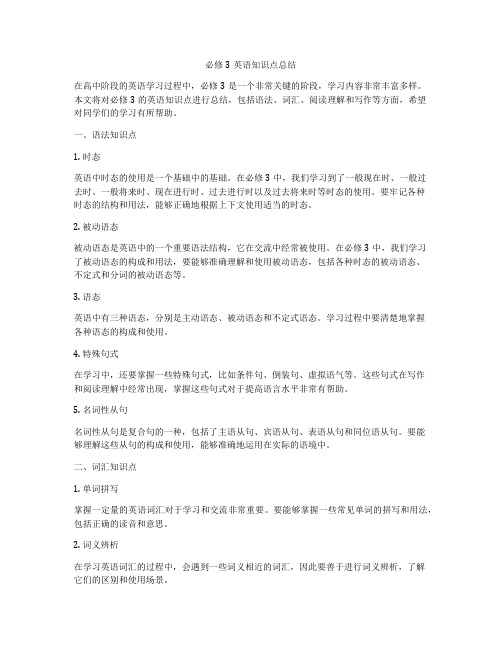
必修3英语知识点总结在高中阶段的英语学习过程中,必修3是一个非常关键的阶段,学习内容非常丰富多样。
本文将对必修3的英语知识点进行总结,包括语法、词汇、阅读理解和写作等方面,希望对同学们的学习有所帮助。
一、语法知识点1. 时态英语中时态的使用是一个基础中的基础。
在必修3中,我们学习到了一般现在时、一般过去时、一般将来时、现在进行时、过去进行时以及过去将来时等时态的使用。
要牢记各种时态的结构和用法,能够正确地根据上下文使用适当的时态。
2. 被动语态被动语态是英语中的一个重要语法结构,它在交流中经常被使用。
在必修3中,我们学习了被动语态的构成和用法,要能够准确理解和使用被动语态,包括各种时态的被动语态、不定式和分词的被动语态等。
3. 语态英语中有三种语态,分别是主动语态、被动语态和不定式语态。
学习过程中要清楚地掌握各种语态的构成和使用。
4. 特殊句式在学习中,还要掌握一些特殊句式,比如条件句、倒装句、虚拟语气等。
这些句式在写作和阅读理解中经常出现,掌握这些句式对于提高语言水平非常有帮助。
5. 名词性从句名词性从句是复合句的一种,包括了主语从句、宾语从句、表语从句和同位语从句。
要能够理解这些从句的构成和使用,能够准确地运用在实际的语境中。
二、词汇知识点1. 单词拼写掌握一定量的英语词汇对于学习和交流非常重要。
要能够掌握一些常见单词的拼写和用法,包括正确的读音和意思。
2. 词义辨析在学习英语词汇的过程中,会遇到一些词义相近的词汇,因此要善于进行词义辨析,了解它们的区别和使用场景。
3. 词汇扩展很多时候,我们需要用一些近义词替换原有的词汇,因此了解词汇的对应词义和使用也是必不可少的。
4. 习惯搭配在学习词汇的过程中,还要掌握一些常见的习惯搭配,这样能够使表达更加地自然和地道。
三、阅读理解知识点1. 短文阅读在必修3的英语学习中,我们需要阅读一些英语短文,包括新闻报道、故事、科普文章等。
要善于从短文中获取关键信息,理解全文的主旨和作者的观点。
高中英语必修三重要考点总结整理
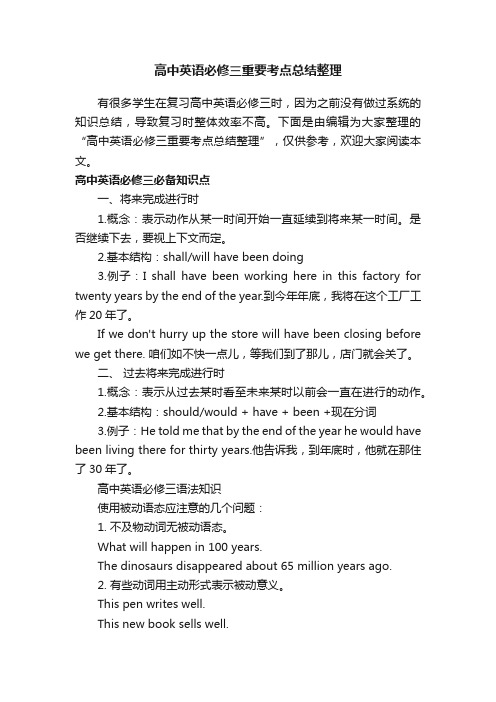
高中英语必修三重要考点总结整理有很多学生在复习高中英语必修三时,因为之前没有做过系统的知识总结,导致复习时整体效率不高。
下面是由编辑为大家整理的“高中英语必修三重要考点总结整理”,仅供参考,欢迎大家阅读本文。
高中英语必修三必备知识点一、将来完成进行时1.概念:表示动作从某一时间开始一直延续到将来某一时间。
是否继续下去,要视上下文而定。
2.基本结构:shall/will have been doing3.例子:I shall have been working here in this factory for twenty years by the end of the year.到今年年底,我将在这个工厂工作20年了。
If we don't hurry up the store will have been closing before we get there. 咱们如不快一点儿,等我们到了那儿,店门就会关了。
二、过去将来完成进行时1.概念:表示从过去某时看至未来某时以前会一直在进行的动作。
2.基本结构:should/would + have + been +现在分词3.例子:He told me that by the end of the year he would have been living there for thirty years.他告诉我,到年底时,他就在那住了30年了。
高中英语必修三语法知识使用被动语态应注意的几个问题:1. 不及物动词无被动语态。
What will happen in 100 years.The dinosaurs disappeared about 65 million years ago.2. 有些动词用主动形式表示被动意义。
This pen writes well.This new book sells well.3. 感官动词或使役动词使用省略to的动词不定式,主动语态中不带to ,但变为被动语态时,须加上to 。
高三必修三重点知识点

高三必修三重点知识点高三是高中阶段最关键的一年,对于学生来说,备考必修科目尤为重要。
而必修三作为高中英语的核心教材,包含了许多重要的知识点。
本文将对高三必修三的重点知识点进行详细介绍。
一、语法知识点1. 主谓一致:主语和谓语动词在人称和数上保持一致。
2. 宾语从句:宾语从句用来作为动词的宾语,需要掌握引导从句的连词和从句的语序。
3. 名词性从句:名词性从句可以在句中充当主语、宾语、表语或同位语,需要熟悉不同类型的名词性从句的结构和用法。
4. 定语从句:定语从句用来修饰名词,在句中作定语,需要掌握引导从句的关联词和从句的语法结构。
5. 虚拟语气:虚拟语气用来表示与事实相反的假设、猜测或建议,需要熟悉虚拟语气的用法和句型。
二、阅读理解1. 根据上下文推测词义:通过上下文的线索,推测生词或短语的意思。
2. 理解篇章结构:了解文章的开头、中间和结尾,分析每个部分的作用和关系,掌握文章的主题和中心思想。
3. 掌握不同文体的阅读技巧:不同文体有不同的写作风格和特点,需要针对不同的文体运用相应的阅读技巧。
三、写作技巧1. 书信写作:掌握书信的格式和写作要点,包括称呼、开头、结尾等。
2. 议论文写作:学会陈述观点、论证、反驳和总结,注意段落结构和过渡词语的运用。
3. 图表写作:能够描述和解释图表中的数据,并进行推测和预测。
四、听力技巧1. 记笔记:听力过程中要学会快速记录关键信息,以便后期的回答问题和作笔记。
2. 注意听力材料中的转折词语和连词:这些词语往往能提供重要的线索,帮助理解听力内容的逻辑关系。
3. 练习听力题型:熟悉并练习各类听力题型,包括听对话、听长对话、听独白等。
五、翻译技巧1. 词汇翻译:注意词义、词性和搭配的准确运用。
2. 句子结构翻译:理解原文句子的结构,按照相应的语法规则进行翻译。
3. 上下文翻译:结合上下文理解句子的含义,并进行相应的翻译。
以上就是高三必修三的重点知识点。
在备考过程中,学生应该重点关注这些知识点,进行有计划的复习和练习。
高中必修三英语的知识点
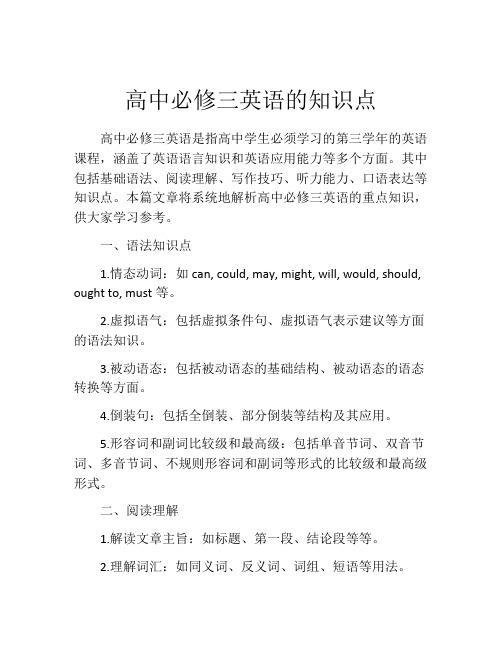
高中必修三英语的知识点高中必修三英语是指高中学生必须学习的第三学年的英语课程,涵盖了英语语言知识和英语应用能力等多个方面。
其中包括基础语法、阅读理解、写作技巧、听力能力、口语表达等知识点。
本篇文章将系统地解析高中必修三英语的重点知识,供大家学习参考。
一、语法知识点1.情态动词:如can, could, may, might, will, would, should, ought to, must等。
2.虚拟语气:包括虚拟条件句、虚拟语气表示建议等方面的语法知识。
3.被动语态:包括被动语态的基础结构、被动语态的语态转换等方面。
4.倒装句:包括全倒装、部分倒装等结构及其应用。
5.形容词和副词比较级和最高级:包括单音节词、双音节词、多音节词、不规则形容词和副词等形式的比较级和最高级形式。
二、阅读理解1.解读文章主旨:如标题、第一段、结论段等等。
2.理解词汇:如同义词、反义词、词组、短语等用法。
3.理解段落结构:识别段落结构、主题句、论据和例证,确定文章的结构。
4.猜测词义:通过上下文关系,猜测未知词汇的含义。
三、写作技巧1.论点明确:考生在写作时需注意文章的论点必须明确。
2.合理组织篇章结构:如首尾相关、中心突出、结构清晰等等。
3.运用丰富的语言:包括词汇、句式、修辞和情感语言等。
4.注意句子的清晰度及其连贯性:如句子的主谓一致、时态正确、语气适当、句子结构合理等。
四、听力能力1.听取重要信息:在听力阶段需注意听取文章的关键信息,如关键词、数字、人名、地名等,以便作答。
2.听取语调和语气:如情感色彩、语言态度、语言优美性质等。
3.提高听力速度:增加输入速度、提高接收理解能力,如有效地使用听力笔记提高听力速度。
五、口语表达1.合理的语调和语气:如合理的强调,注意语速和语调。
2.流利的发音:包括音节的准确、字母的发音等。
3.正确的语法和词汇:包括应用基础语法和常用词汇等。
以上是高中必修三英语的核心知识点,需要同学们认真学习,不断强化自己的英语水平。
高中英语必修三知识点总结归纳

高中英语必修三知识点总结归纳只要我们拥着勤奋去思考,拥着勤奋的手去耕耘,用抱勤奋的心去对待工作,浪迹红尘而坚韧不拔,那么,我们的生命就会绽放火花,让人生的时光更加的闪亮而精彩。
下面给大家提供一些关于高中必修三知识点总结归纳,希望对大家有所帮助。
重点词汇、1. system 系统,体系2. theory 学说,理论3. violent 猛烈的,剧烈的,4. in time 及时,终于5. unlike 不同,不像6. harmful 有害的7. lay eggs 下蛋8. exist 存在,生存9. give birth to 产生,10. in one’s turn 轮到某人11. prevent from 阻止12. puzzle 谜,难题/使迷惑13. pull 拉,牵引力14. cheer up 感到振奋15. now that 既然16. break out 突发,爆发17. watch out 密切注视重点句型1. We usually think of science subjects asphysics, chemistry, biology and mathematics.通常我们认为科学为、、、和。
2. When are they to hand in their plan?他们的方案什么时候交上来。
3. Whether we help him or not, he will fail.不管我们帮助他与否,他都将失败。
4. It exploded loudly with fire and rock, whichwere in time to produce the water vapour, carbon dioxide, oxygen, nitrogen andother gases, which were to make the earth’s atmosphere. 它(地球)巨大的爆炸喷出了烈火与岩石,最终产生了水蒸气、二氧化碳、氧、氮和其他多种气体,从而形成了地球的大气层。
必修三英语知识点总结
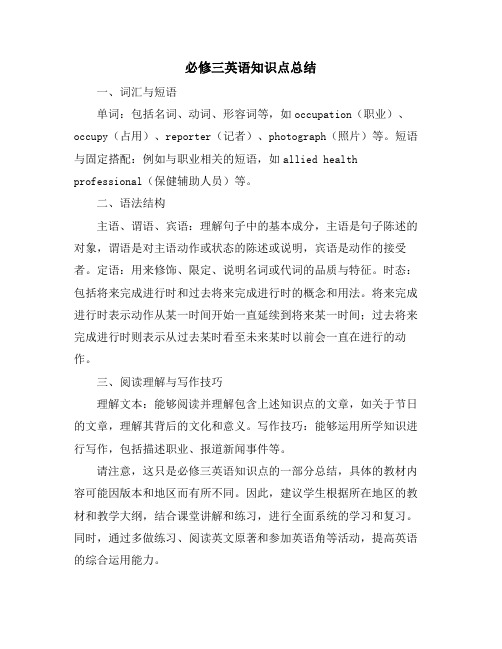
必修三英语知识点总结
一、词汇与短语
单词:包括名词、动词、形容词等,如occupation(职业)、occupy(占用)、reporter(记者)、photograph(照片)等。
短语与固定搭配:例如与职业相关的短语,如allied health professional(保健辅助人员)等。
二、语法结构
主语、谓语、宾语:理解句子中的基本成分,主语是句子陈述的对象,谓语是对主语动作或状态的陈述或说明,宾语是动作的接受者。
定语:用来修饰、限定、说明名词或代词的品质与特征。
时态:包括将来完成进行时和过去将来完成进行时的概念和用法。
将来完成进行时表示动作从某一时间开始一直延续到将来某一时间;过去将来完成进行时则表示从过去某时看至未来某时以前会一直在进行的动作。
三、阅读理解与写作技巧
理解文本:能够阅读并理解包含上述知识点的文章,如关于节日的文章,理解其背后的文化和意义。
写作技巧:能够运用所学知识进行写作,包括描述职业、报道新闻事件等。
请注意,这只是必修三英语知识点的一部分总结,具体的教材内容可能因版本和地区而有所不同。
因此,建议学生根据所在地区的教材和教学大纲,结合课堂讲解和练习,进行全面系统的学习和复习。
同时,通过多做练习、阅读英文原著和参加英语角等活动,提高英语的综合运用能力。
必修三英语知识点

必修三英语知识点必修三英语知识点必修三是高中英语教材中的一本教材,涵盖了高中英语的一些重要知识点。
下面是必修三中的一些重要知识点的总结。
1. 动词时态和语态:在必修三中,学生将学习到更多的动词时态和语态的用法。
例如,一般现在时用来表达经常性的动作,一般过去时用来表达过去发生的事件,现在进行时用来表达现在正在进行的动作等等。
此外,被动语态也是必修三中重要的知识点之一。
2. 名词性从句:名词性从句是指在句中作为名词的从句。
在必修三中,学生将学习到名词性从句的引导词和结构。
例如,学生将学会如何使用“that”和“if”来引导名词性从句,并学会如何转换为宾语从句、主语从句和表语从句。
3. 形容词和副词的比较级和最高级:学生将学会如何使用形容词和副词的比较级和最高级来进行比较。
例如,比较级通常用来比较两个人或物的不同,最高级用来比较三个或以上的人或物的不同。
学生还会学到一些特殊形式的比较级,如good-better和bad-worse。
4. 介词和介词短语:介词和介词短语是必修三中的重要知识点之一。
学生将学会如何使用介词来表达时间、位置和目的等。
例如,in、on、at用来表示时间,in、on、at、under、behind 等用来表示位置,to、for等用来表示目的。
5. 宾语从句:宾语从句是作为宾语的从句。
在必修三中,学生将学习如何使用宾语从句的引导词和结构。
例如,学生将学会如何使用“that”和“if”等来引导宾语从句。
6. 状语从句:状语从句是作为状语的从句。
在必修三中,学生将学会如何使用状语从句的引导词和结构。
例如,学生将学会如何使用“if”来引导条件状语从句,如何使用“because”来引导原因状语从句等。
7. 时态和语态的转换:学生将学会如何根据上下文的要求来进行时态和语态的转换。
例如,可以将一般现在时转换为一般过去时,将主动语态转换为被动语态等。
以上是必修三中的一些重要知识点总结,这些知识点对于学生掌握和提高英语水平非常重要。
高中英语必修3知识要点归纳
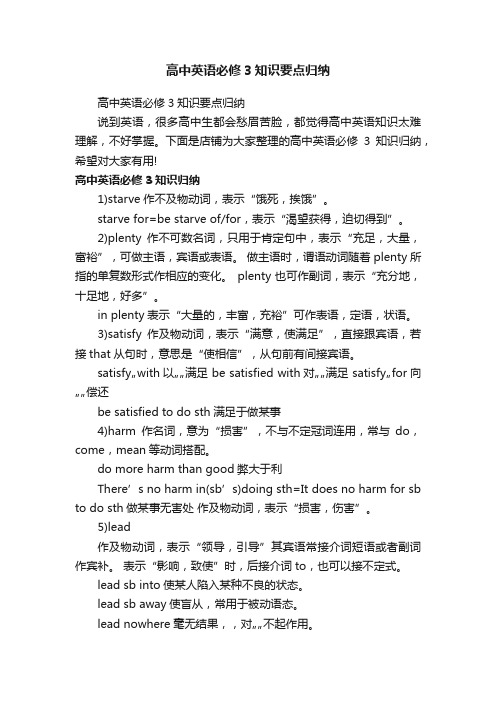
高中英语必修3知识要点归纳高中英语必修3知识要点归纳说到英语,很多高中生都会愁眉苦脸,都觉得高中英语知识太难理解,不好掌握。
下面是店铺为大家整理的高中英语必修3知识归纳,希望对大家有用!高中英语必修3知识归纳1)starve作不及物动词,表示“饿死,挨饿”。
starve for=be starve of/for,表示“渴望获得,迫切得到”。
2)plenty作不可数名词,只用于肯定句中,表示“充足,大量,富裕”,可做主语,宾语或表语。
做主语时,谓语动词随着plenty所指的单复数形式作相应的变化。
plenty也可作副词,表示“充分地,十足地,好多”。
in plenty表示“大量的,丰富,充裕”可作表语,定语,状语。
3)satisfy作及物动词,表示“满意,使满足”,直接跟宾语,若接that从句时,意思是“使相信”,从句前有间接宾语。
satisfy…with以……满足 be satisfied with对……满足satisfy…for向……偿还be satisfied to do sth满足于做某事4)harm作名词,意为“损害”,不与不定冠词连用,常与do,come,mean等动词搭配。
do more harm than good弊大于利There’s no harm in(sb’s)doing sth=It does no harm for sb to do sth做某事无害处作及物动词,表示“损害,伤害”。
5)lead作及物动词,表示“领导,引导”其宾语常接介词短语或者副词作宾补。
表示“影响,致使”时,后接介词to,也可以接不定式。
lead sb into使某人陷入某种不良的状态。
lead sb away使盲从,常用于被动语态。
lead nowhere毫无结果,,对……不起作用。
lead up to sth作为……准备,导致。
lead作为名词,give sb a lead给某人做出榜样,提示某人6)origin是名词,表示“起源,起因,出身”。
- 1、下载文档前请自行甄别文档内容的完整性,平台不提供额外的编辑、内容补充、找答案等附加服务。
- 2、"仅部分预览"的文档,不可在线预览部分如存在完整性等问题,可反馈申请退款(可完整预览的文档不适用该条件!)。
- 3、如文档侵犯您的权益,请联系客服反馈,我们会尽快为您处理(人工客服工作时间:9:00-18:30)。
必修三unit1 take place / happen / break out 无被动starve to death 饿死starve to do渴望做..starve for 渴望得到..in memory of 纪念dress up 穿上盛装,打扮5. play a trick / tricks onplay a joke / jokes onaward sb. sth.=award sth. to sb.授予某人某物reward sb. for sth. 因... 而报答,奖赏某人reward sb. with sth. 用...报答,酬谢某人look forward to doing*以介词to结尾的短语pay attention to (doing)devote… to (doing)attach… to (doing)attach great importance to... 认为...很重要without permission.未经许可permit doing sth.permit sb.to dosb be permitted to doturn up 出现,调高turn down 拒绝,调低turn out (to be ) 结果是turn to sb (for help) 求助10 keep one’s word守信用;履行诺言hold one’s breath屏息;屏气11.apologize to sb for sthmake an apology to sb for sthset off (for...) = set out(for...) 动身,出发remind sb. of sth. /sb.使某人想起… remind sb. to do sth. 提醒某人做某事14.mean to do打算做mean doing 意味着15 be satisfied with 对…感到满意satisfying 令人满意的16 lead to 导致;通向,通往17. It is/was obvious that。
很明显……18. get/be married toU21. have / keep a healthy diethave / keep a balanced dietbe / go on a diet 节食2. show curiosity about sthdo sth out of curiositysatisfy one’s curiositybe curious about3. get away with cheating / lying 作弊/ 撒谎做而不受惩罚4. lie to sb / tell a lie to sb原形过去式过去分词现在分词撒谎lie lied lied lying 躺,位于lie lay lain lying放置,铺设;下蛋lay laid laid laying 5.at a discount6. win… back 赢回;重新获得7. strengths and weaknesses8. earn one’s living / make a living by9.be (heavily) in debt10. glare at 怒视stare at 凝视,盯着glance at 匆匆看一眼11. limit...to... 把...限制在...范围内The doctor limited the patient to two meals a day.All speeches are limited to 10 minutes.be of benefit to = be beneficial to 对...有好处for the benefit of 为了...的好处get much benefit from。
= benefit a lot from... 从....获得好处benefit sb /sth 使...受益13. cut down the costcut down on smoking14. before long 不久以后long before 很久以前15. We went home, (feeling) frustrated.伴随状语16. Nothing could be better.否定词+形容词或副词比较级,表达最高级的含义。
17. have sb. doing sth.(与can’t/won’t 连用)容忍某人做某事have sb. / sth. doing sth. 使某人或某物一直做某事have sb. do sth. 使某人做...have sb. / sth. done18. only to do出乎意料的结果U3bring up 抚养; 提出scenery 是总称, 指大范围的自然风光scene指人的活动场面view是指人以一定的角度(或从远处或从高处等)所看到的景色,还有“观点”, “看法”的意思。
permit doing sth.permit sb. to do sth. →sb.be permitted to do sth.如: We don’t permit smoking in the office.We aren’t permitted to smoke in the office.*Weather permitting, we’ll have a picnic.with sb’s permission在…的允许下ask sb for permission征求某人的许可4. go ahead*(用于祈使句)可以,做吧5. stare at 盯着glare at 怒视glance at 匆匆看一眼6. account for 是…的原因,解释;导致;占了7. on the contrary8. a (large) amount of money9. as for 关于,至于10.take a chance11. in rags12. be about to do…when … 正要做某事突然…U41.in time 及时,最终on time 准时;按时at a time一次at one time 曾经2. be fundamental to 对…是基本的3. be harmful to4.give birth to 产生;分娩5 .in one’s turn 轮到某人take turns to do sth / do sth by turns轮流做某事in turn 转而,因而6. prevent/stop sb (from) doing keep sb from doing 阻止某人做某事7. block out 挡住光线8. cheer up9. now that 既然,由于10.break out (战争,火灾,争吵,疾病)爆发break up打碎,解散,关系破裂break down机器坏了,(人)身体垮了break into闯入,打断11 watch out for12. as + adj. + a/an + 单数可数名词+ as如:She is as good a teacher as her mother.倍数表达法1)A + be + 倍数+ as + adj原级+ as + B如:This tree is three times as tall as that one.2)A + be + 倍数+ adj比较级+ than + BThis River is twice longer than that River.3) A + be +倍数+ the + n.+ of + n. (这样的名词主要有length, size, height, weight,depth等)The building is four times the height of that one.U51. rather than而不是(连接两个平行结构)rather than位于句首时,则后接动词原形。
more than 不仅仅;超过;非常other than 除了……would rather do...than do... 宁愿……而不愿……would do...rather than do... 宁愿……而不愿……prefer to do... rather than do... 宁愿……而不愿……2. be surrounded by 被……包围,围住surroundings n.环境3. 动词主动形式表被动意义The book sells well.The pen writes well.The room measures ten meters long.)*take measures 采取措施4. settle down5.caught sight of 看见at the sight of一看到6. have a gift for 对...有天赋7. in the distance 在远处at a distance of ten meters 在…远的地方8.be impressed by 对...印象深刻impress sb with sth impress sth on sb 使铭记impression n. 印象sth leave / make a deep impression on sb 给…留下深刻印象。
